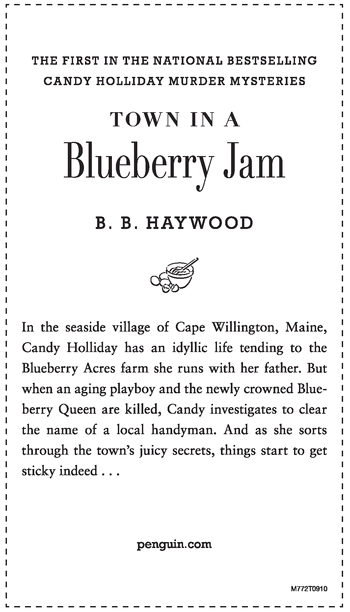Town In a Lobster Stew (44 page)
Read Town In a Lobster Stew Online
Authors: B.B. Haywood

Candy Holliday was sitting at the kitchen table, paging through seed catalogs and sipping a cup of hot tea, when she looked out the window and saw the figure emerge from the woods.
It was one of those rare days in late January when the morning sun hit the blueberry barrens behind the house just right, reflecting off the layer of ice and snow that had settled across the fields like a patchwork winter quilt, sending off sparkles and shoots of light, turning everything magic. If you stepped out on the porch this morning (which you could do for a few minutes without putting on a coat), you could actually hear the ice cracking as it loosened its grip on rooftops and tree branches. You might even hear a few distinctive drip-drops here and there.
The January thaw had arrived.
Candy breathed a sigh of relief as she turned the page of one of her catalogs. She loved this time of year. The frantic pace of the holidays was behind them, all traces of it carefully packed away for another year, and the days were growing noticeably longer. They’d have nearly forty-five more minutes of daylight at the end of January than they’d had at the beginning of the month. That in itself was a cause for celebration.
So Candy had set aside this morning to plan for spring, designing her gardens and ordering seeds. She’d slept in a little late (until eight thirty) and shuffled her father, Henry “Doc” Holliday, off to his daily ritual breakfast and jawing session at Duffy’s Main Street Diner. Doc’s crew was at winter staffing levels, since Finn Woodbury, a retired cop who also ran several local summer theater productions as well as the annual American Legion flea market on Memorial Day, had headed south to Florida with his wife, Marti, pulling a fifth-wheeler behind their truck. But despite the winter chill and the absence of a key crew member, Doc still made a beeline for the diner practically every weekday morning to drink coffee, eat doughnuts, complain about the weather (there was always something to complain about, even with the January thaw), and chew over the latest tasty bits of local news with his friends William “Bumpy” Brigham and Artie Groves.
Candy enjoyed having mornings like this to herself. She’d lit a fire to take the chill off the house and heated a kettle of water for tea. Then she’d settled in at the kitchen table for some serious, pleasurable work. She’d do all the ordering online later in the morning, but first she wanted to take her time perusing the catalogs, drawing diagrams of her garden plots, making notes on which seeds to order, and deciding where to plant what.
It was a wonderful way to spend a quiet winter morning.
As she sipped her tea she read over descriptions of yellow crockneck squash, red burgermaster onions, Royal Mountie tomatoes, and sweet King Arthur peppers (a favorite of Doc’s). She was particularly engrossed in a description of Boothby’s Blonde heirloom cucumbers when, distracted by the barest movement at the far corner of her peripheral vision, she looked up and out the window—and that’s when she saw the figure.
It spooked her at first, since it was such an unusual and unexpected sight, and she heard herself gasp in surprise. Unaware of what she was doing, she set the mug of tea down with a
thunk
and rose quickly from her chair, never taking her eyes from the figure and the line of trees. She wasn’t used to seeing people behind the house. The farm’s blueberry barrens extended nearly a quarter of a mile in some directions, and the back acreage was still choked with woods and shrubbery. The nearest houses in that direction lay perhaps half a mile away, maybe more. It was walkable, but no one ever came that way.
thunk
and rose quickly from her chair, never taking her eyes from the figure and the line of trees. She wasn’t used to seeing people behind the house. The farm’s blueberry barrens extended nearly a quarter of a mile in some directions, and the back acreage was still choked with woods and shrubbery. The nearest houses in that direction lay perhaps half a mile away, maybe more. It was walkable, but no one ever came that way.
So who was this figure stumbling out of the woods and onto the downward sloping blueberry field?
Candy instantly realized something was wrong.
She watched in growing shock and fascination as the figure—a man, she realized—staggered forward, moving awkwardly on the blanket of snow and ice, weaving uncertainly around gray-black boulders left behind eons ago by retreating glaciers. As he walked, he repeatedly looked back over his shoulder. He’d taken perhaps a dozen steps when he lost his footing and dropped to the ground.
He lay there, unmoving.
Before she could think about what she was doing, Candy was headed toward the door, her tea and catalogs forgotten. She paused only briefly to pull on a pair of boots and grab her butternut-yellow fleece jacket before dashing outside, along the porch, and around the side of the building toward the blueberry fields behind the house.
As she ran she kept her eyes on the fallen figure, but he didn’t move. The day was clear and crisp, still chilly despite the warming air, and almost immediately she felt her nose and the tips of her ears getting cold as she ran, her breaths coming quickly. She moved carefully over the snowpack, avoiding the treacherous icy patches. She didn’t want to wind up on her backside or, heaven forbid, injure herself with an awkward fall.
It took her a few minutes to reach the fallen man, and as she approached she could hear him give out a low groan. She slowed, cautious. “Are you hurt?” she called out, crouching a little, still moving forward, brushing the hair back from her face. “Do you need help?”
He groaned again, and a leg moved, kicking out in discomfort. He was wearing dark brown pants tucked into calf-high boots, a green flannel shirt, a knit cap, and an unzipped heavy black coat with a fur-edged hood. His head turned toward her as she approached, his eyes gazing up worriedly. She saw his salt-and-pepper beard, the sad, cautious eyes, the unkempt hair. She gasped, recognizing the face.
“Solomon Hatch!”
She hurried toward him as he struggled to sit up, but his elbows slid out from under him and he fell back, groaning again. Candy finally reached him and dropped to one knee, her gaze scanning his body. At first glance, she didn’t see any injuries. “Solomon, what’s wrong? It’s me, Candy Holliday. Are you hurt? Do you need help?”
She’d only met him once or twice before, but she’d heard talk of him dozens, perhaps hundreds of times. He was the town hermit, a shabby, bearded recluse who lived in a primitive, isolated cabin somewhere in the woods north of Cape Willington. He was a man who kept to himself, coming into town only on rare occasions to replenish his stocks of sugar, coffee, flour, and kerosene.
But what was he doing here at Blueberry Acres? And what had he been doing in the woods? “Solomon, what’s wrong?” Candy asked again, uncertain of what do to. “Do you need help?”
He looked at her wildly, like a cornered animal. His mouth worked, as if he were trying to speak, but no words came out. He looked terrified as he glanced again at the woods. It was almost as if he expected to see someone crashing out from the trees, chasing after him.
Candy looked toward the woods too, and when she looked back, she saw Solomon reaching out to her with a shaky arm, but she didn’t back away. His fingers grasped desperately at a fold in her fleece jacket near her right shoulder. Latching on, he pulled her close, raising his head toward her as he spoke. “Body . . . in the woods,” he breathed, the words rattling in his chest. He fell back then, groaning as his eyes closed.
“What? There’s a body? Where?” Candy turned again toward the dark line of trees at the top of the slope.
Body. In the woods.
Candy was torn. She’d been in those woods hundreds of times, and knew them well. Should she investigate herself? Should she go look for a body?
Should she stay with Solomon?
Or should she get help?
She looked back at Solomon. He seemed to have fallen into unconsciousness, his thin body sprawled on the cold snowpack.
Her first task, she realized, was to get him to a warm, safe place.
“Solomon, can you move?” She took him by the shoulder and tried to lift him, but he was too heavy for her.
She needed help.
She turned and looked back at the house. That was her best bet, she knew.
Moving as quickly as she could, her breathing loud in her ears now, she ran back down the way she’d come. She moved swiftly but cautiously, her boots crunching into the loosening snow. She nearly tripped several times as she raced over the blueberry bushes and rough ground, but she managed to keep her balance.
As she reached the house, she turned to check on Solomon before she went inside to call the police. But what she saw made her stop dead in her tracks.
Solomon was gone.
She blinked several times and refocused her gaze. But she wasn’t mistaken.
The unconscious hermit she’d left lying in the snow had disappeared.


Berkley Prime Crime titles by B. B. Haywood
TOWN IN A BLUEBERRY JAM
TOWN IN A LOBSTER STEW
TOWN IN A LOBSTER STEW
Other books
What Haunts Me by Margaret Millmore
Outback Hearts (Beyond Reality Book 1) by Stoker, Susan
Sudden Exposure by Susan Dunlap
The Secret Friend by Chris Mooney
What Ever Happened to Baby Jane? by Henry Farrell
Love and Learn (Voretti Family Book 2) by Ava Blackstone
Death Storms the Shore (A Kate Kennedy Mystery Book 4) by Noreen Wald
On Black Wings by Storm, Sylvia
At the Queen's Command by Michael A. Stackpole
Desire Unchained by Larissa Ione